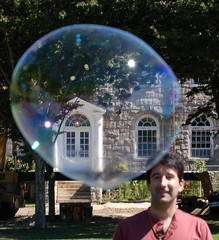We all need somewhere to live, a place of privacy and rest. For the last sixty years, it made economic sense to buy and own a home – generally, prices went only one way, UP!
Australia now has a fully inflated housing bubble awaiting a pinprick.
When it happens (soon, soon), the housing market will be flooded with houses for sale by motivated sellers.
- There are 1.3 million Australian taxpayers with negatively geared properties. With interest charges consuming the rents and their personal incomes, and only capital losses to look forward to, the motivation to hold residential real estate will evaporate.
- Distressed owners – with large mortgages and negative equity – will try to hold out, sometimes for years. Eventually, these holders will capitulate. Heavy mortgage repayments are futile when prices are falling and rents are a fraction of the interest charges.
- Buyers will sit on their hands. Why buy today when prices will be lower tomorrow? Why commit in the face of great uncertainty about future price direction?
So, with the home owner market fighting for its life, what does the rental market look like after the bubble bursts?
The USA is nearly four years post-bubble and their experience holds grim lessons for Australia.
Firstly, there will be a change of psychology. Renting will gain a new allure, particularly among young adults. The total cost of shelter is known and risk-free. Repairs and maintenance are the owner’s problem. Rates and taxes fall on the owner too.
Their views will be informed by what they have seen happen around them: home ownership can destroy people’s lives.
Secondly, the supply of property available to let will grow strongly, driving down rents. Many unable to sell will turn to renting out their properties. While there will be more renters, the number of distressed owners (including banks) seeking a return – any return! – will drive down rents.
The USA now has rental vacancy rates above ten per cent. This is imposing a firm ceiling on rent rises, a situation expected to last for years.
“There is no iron law that real estate must appreciate,” says Stan Humphries, chief economist for the US real estate site Zillow. “All those theories advanced during the boom about why housing is special – that more people are choosing to spend more on housing, that more people are moving to the coasts, that we were running out of usable land – didn’t hold up.”
Australians have been seduced into buying homes at inflated prices by a mismatch in supply and demand – a mismatch prompted by feverish speculation. This is about to reverse.
Exempting owner occupied property from taxation is modestly helpful to the middle classes and a great boost to the wealthy.
But this tax-free status has funnelled savings away from productive investment into consumption. This misguided policy is about to destroy the dreams and finances of a generation.
Major trauma leaves its survivors determined to make sure the tragedy never happens again. We have the tools to make this so, to deter speculation and the misallocation of scarce resources with a powerful automatic stabilizer.
That stabilizer is Land Tax. The money it raises can be spent on infrastructure, in reducing distortions like Payroll Tax (a tax on jobs) and Company Tax (a tax on enterprise).
A universal Land Tax would confer massive benefits on Australia, greater than the gains of the Keating reforms that floated the dollar and removed tariffs. It is all in the Henry Taxation Review.
Ending the free ride landowners enjoy on the backs of working Australians would galvanize economic activity and liberate our animal spirits.
Economists call this happy state a ‘Golden Age’. I’d like to see that!




“Many unable to sell will turn to renting out their properties. While there will be more renters, the number of distressed owners (including banks) seeking a return – any return! – will drive down rents.”
Yes, but modes of “seeking a return” will vary. If you’re an individual investor whose hope of flipping for a profit has been dashed, you’ll seek a tenant now or sell now. But if you’re a bank with a stock of repossessed homes, you can generate an annual cash flow by selling off a percentage of your stock each year, hoping the stock will last long enough to get you through the slump. And if you’re a big bank with a big stock, you’ll be able to raise prices somewhat by keeping your unsold stock empty.
So the benefit to renters depends on what what fraction of distressed owners manage to sell or let their properties before they fall into the hands of banks.
Interesting theory Gavin, but having lived through two UK housing slumps and closely watched the US one, that does not seem to be how banks behave. They generally seem to want to get rid of properties as soon as possible. The fact is that banks have no interest and no expertise in maintaining a portfolio of properties; they would rather sell up, write off, and move on.
Great article David. Since arriving from the UK a few months ago I have been amazed at the state of the property market here, and the fact that the debate about it seems to take place in a bubble without reference to what is happening in the rest of the world. I’m hearing a lot of the same rationalisations I heard about the UK property market 4 years ago, and we all know how that ended… (minus 20 to 30% and counting)